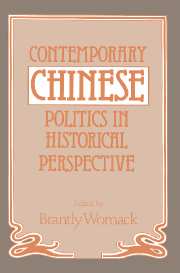Book contents
- Frontmatter
- Contents
- Contributors
- Preface
- Introduction
- PART I CONTEMPORARY CHINA AND ITS PREREVOLUTIONARY HERITAGE
- 1 The Dengist reforms in historical perspective
- 2 In search of democracy: public authority and popular power in China
- 3 A bourgeois alternative? The Shanghai arguments for a Chinese capitalism: the 1920s and the 1980s
- PART II POLICY DYNAMICS WITHIN THE PEOPLE'S REPUBLIC OF CHINA
- PART III CHINA'S EVOLVING WORLD ROLE
- PART IV TIANANMEN
- Index
1 - The Dengist reforms in historical perspective
Published online by Cambridge University Press: 03 May 2010
- Frontmatter
- Contents
- Contributors
- Preface
- Introduction
- PART I CONTEMPORARY CHINA AND ITS PREREVOLUTIONARY HERITAGE
- 1 The Dengist reforms in historical perspective
- 2 In search of democracy: public authority and popular power in China
- 3 A bourgeois alternative? The Shanghai arguments for a Chinese capitalism: the 1920s and the 1980s
- PART II POLICY DYNAMICS WITHIN THE PEOPLE'S REPUBLIC OF CHINA
- PART III CHINA'S EVOLVING WORLD ROLE
- PART IV TIANANMEN
- Index
Summary
The events of June 4, 1989, in a very real sense brought the Dengist period to a close. What defined the Dengist period more than anything else were three interrelated premises: the subordination of ideological struggle to economic development, the adoption of a “middle course,” and the recognition of the “relative autonomy” of specific fields of knowledge. The crackdown on June 4 severely compromised each of those.
The Third Plenum of the Eleventh Central Committee, in December 1978 – the meeting that marked the inauguration of the Dengist period – called for shifting the emphasis of work to economic development. The importance of that decision lay in its reversal of the relationship that had existed between ideology and economic policy in the preceding three decades of the People's Republic of China (PRC). Previously, ideology had been the linchpin around which economic policy revolved. At the Third Plenum, the effort to integrate the party and nation around a common ideology, which had resulted in violent ideological struggle rather than unity, was abandoned in favor of an agreement on the primacy of economic development. The presumption was that with economic development, both the urgency and the divisiveness of ideological questions would be reduced.
Ideology thus changed from an organizing principle to a boundary. As expressed by the “Four Cardinal Principles” – which affirmed the leading position of the Chinese Communist Party (CCP), the role of Marxism- Leninism and Mao Zedong Thought, the people's democratic dictatorship, and the socialist road – ideology became a marker beyond which the expression of ideas was not to go, a barrier against “bourgeois liberalization.”
- Type
- Chapter
- Information
- Contemporary Chinese Politics in Historical Perspective , pp. 23 - 52Publisher: Cambridge University PressPrint publication year: 1991
- 1
- Cited by



